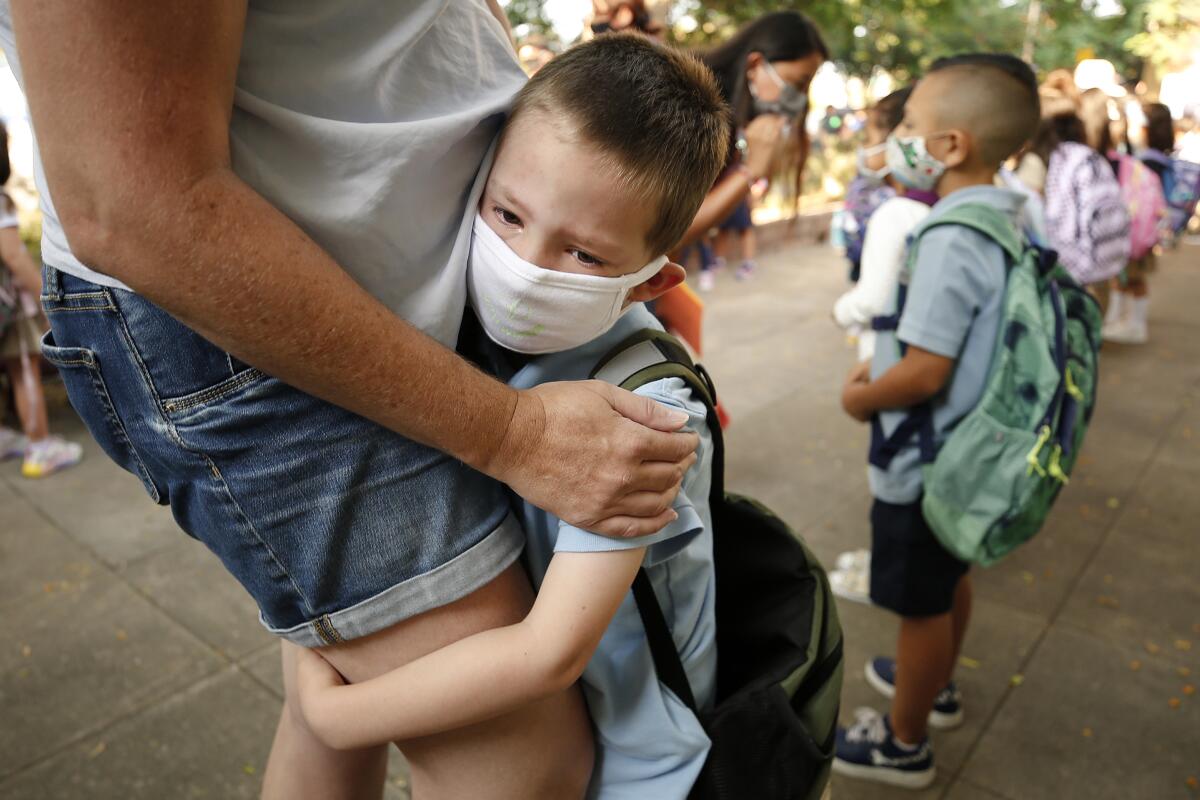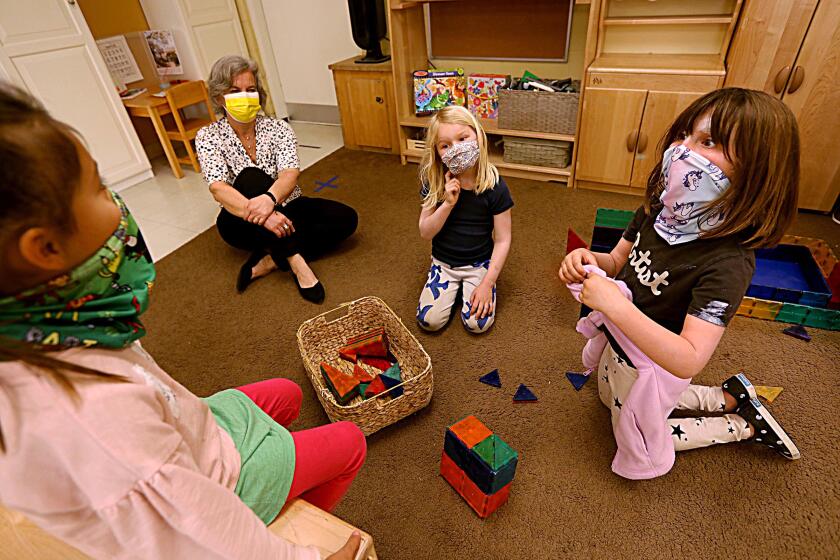California lawmakers approve bill to make kindergarten mandatory, again

- Share via
SACRAMENTO — California is one step closer to mandating that children attend kindergarten, a requirement that would come after droves of the state’s youngest students skipped the grade during the pandemic, heightening learning gap concerns.
A bill approved by the state Senate this week is headed to the governor’s desk and would require children to complete a year of kindergarten before entering first grade, beginning in the 2024-25 school year.
“This ensures that children receive critical instruction in their earliest years of learning and are properly prepared,” said Sen. Susan Rubio (D-Baldwin Park), a former teacher and author of Senate Bill 70. “For students who have not been enrolled in kindergarten, oftentimes teachers and parents spend way too much time trying to teach foundational skills and their peers are already ahead and have mastered those skills.”
Although Gov. Gavin Newsom has made early education a part of his gubernatorial agenda, increasing access to preschool and transitional kindergarten statewide, it is uncertain whether he will sign the bill as his Department of Finance opposed the bill because of its costs.
A legislative analysis put the estimate for increased state funding for mandatory kindergarten in the low hundreds of millions annually based on the assumption that 30,000 more children would enroll in school.
“It’s fundamentally just money — that’s the only plausible negative argument,” said Kevin Gordon, a longtime education lobbyist in Sacramento. “The governor without question owns the achievements in the early education space; he has accomplished so much. The idea of mandated kindergarten is consistent with his agenda, but it’s yet one more cost he may not want to take on this year.”
Newsom has until Sept. 30 to sign or veto the bill.
Gov. Newsom’s budget is flush with money he has to spend on education. He sets sights on transitional kindergarten for all.
Prior attempts to mandate kindergarten in California have failed. In 2014, Gov. Jerry Brown vetoed an identical bill.
“Most children already attend kindergarten, and those that don’t may be enrolled in other educational or developmental programs that are deemed more appropriate for them by their families,” Brown said in his veto message. “I would prefer to let parents determine what is best for their children, rather than mandate an entirely new grade level.”
Like most states, California does not require kindergarten as part of its compulsory education laws. California children who are 5 years old are eligible for kindergarten but are not required by law to attend school until they are 6.
Under SB 70, California would join 19 states where kindergarten is not an option but a requirement. The bill specifies that other early education programs, such as transitional kindergarten, which serves 4-year-olds, do not count toward the requirement. Under the bill, students can choose to attend public or private kindergarten.
Although kindergarten is already well attended — about 95% of eligible students enrolled before the COVID-19 pandemic, according to the California Department of Education — proponents of the bill said allowing the grade to be optional misleads parents about its benefits.
Early education advocates point to research that shows kindergarten helps form social and academic skills that are key to lifelong development — and those who skip it could fall behind their peers.
Newsom last year unveiled an expansive, multibillion-dollar plan to offer free transitional kindergarten programs to all California children, framing the move as an equity-driven policy that in essence creates a new grade and works to make sure some 4-year- olds don’t start off already behind. Like kindergarten, transitional kindergarten is not mandatory but optional.
Under California’s content standards, kindergartners focus on phonics, active listening and understanding sentence structure. Kindergartners also learn to add and subtract under five, using counters such as cubes to understand math. For some students, it may be the first time they learn basic skills such as holding a pencil, writing their name or raising their hand to ask a question.
The Los Angeles Unified School District is a sponsor of the bill. Supt. Alberto Carvalho said the district’s youngest students have been among the most challenging to enroll during the pandemic.
“Mandating a full year of kindergarten ensures students receive high-quality academic, social and developmentally appropriate learning experiences,” Carvalho said.
California schools have seen big enrollment drops with kindergarten making up an outsize share of the decrease. Enrollment in kindergarten declined by 61,000 students in 2020-21, according to state data.
Those data are skewed by the pandemic, as parents opted out during a tumultuous year of campus closures and distance learning. Proponents of the bill said families may think kindergarten is not essential because it’s optional.
Large urban districts, including L.A. Unified, accounted for about one-third of the decline.
“Thousands of California families chose to keep their children out of kindergarten this past year due to the pandemic, opting instead for other in-person programs or no school at all. That means thousands — or potentially tens of thousands — more children than usual will be eligible for first grade next school year without having been through kindergarten, putting even more stress on an already strained system,” the California Teachers Assn. said in a letter to Newsom on Tuesday, urging him to sign SB 70.
Alison Yoshimoto-Towery, L.A. Unified’s chief academic officer, told lawmakers at an Assembly Education Committee hearing in June that low-income families are less likely to opt in to kindergarten. Absentee rates are also disproportionately higher in the grade because families don’t take it seriously, she said.
“Making it compulsory allows the district to reach out, to call, to do home visits, to counsel parents,” Yoshimoto-Towery said. “It closes that opportunity gap earlier.”
The California Homeschool Network opposed the bill, calling it an unnecessary mandate that limits choice.
“This new legislation would require them to start in kindergarten regardless of their preparation and social skills — in other words, mandating 13 years of formal education instead of 12,” the group said in a statement. “Better education policy would consider both mastery and maturity, not chronological age.”
Another bill, AB 1973 by Assemblymember Kevin McCarty (D-Sacramento), is also headed to Newsom’s desk and aims to require that school districts offer full-day kindergarten. Right now, some districts offer only part-time programs that last three hours a day.
That bill was opposed by the California School Boards Assn., which cited concerns about a lack of support for districts to accommodate an expansion of kindergarten.
“Many offer separate morning and afternoon kindergarten programs not for policy reasons, but rather because they lack adequate facility capacity and/or teachers to meet demand,” the group said in a statement.
Times staff writer Howard Blume contributed to this report.
More to Read
Sign up for Essential California
The most important California stories and recommendations in your inbox every morning.
You may occasionally receive promotional content from the Los Angeles Times.
















